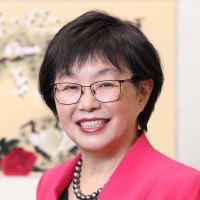Invited Session 6 (Panel): From Setbacks to Solutions: Experiences Gained in Complex Oncology Trials
3:30 PM - 5:15 PM, May 17, 2025; Chem-H Rotunda E241
Chair: J. Jack Lee
Panel: Laura Esserman, Alice Chen, Liza Villaruz, Sammi Tang, Kyle Wathen
Chair: Dr. J. Jack Lee, University of Texas MD Anderson Cancer Center
 J. Jack Lee, Ph.D., M.S., D.D.S. is Professor of Biostatistics and Kenedy Foundation Chair in Cancer Research at the University of Texas MD Anderson Cancer Center. His areas of expertise include design and analysis of cancer clinical trials, Bayesian adaptive designs, statistical computation/graphics, drug combination studies, biomarkers identification and validation, and statistical methods for precision medicine. In over 30 years of service at MD Anderson, Dr. Lee has been working with many multidisciplinary research teams and providing biostatistical support to clinical, translational, and basic science studies. He is an elected Fellow of American Statistical Association, Society for Clinical Trials, and American Association for the Advancement of Science. He has published extensively in statistical and medical journals. He co-authored two books entitled: “Bayesian Adaptive Methods for Clinical Trials” and “Model-Assisted Bayesian Designs for Dose Finding and Optimization: Methods and Applications.”
J. Jack Lee, Ph.D., M.S., D.D.S. is Professor of Biostatistics and Kenedy Foundation Chair in Cancer Research at the University of Texas MD Anderson Cancer Center. His areas of expertise include design and analysis of cancer clinical trials, Bayesian adaptive designs, statistical computation/graphics, drug combination studies, biomarkers identification and validation, and statistical methods for precision medicine. In over 30 years of service at MD Anderson, Dr. Lee has been working with many multidisciplinary research teams and providing biostatistical support to clinical, translational, and basic science studies. He is an elected Fellow of American Statistical Association, Society for Clinical Trials, and American Association for the Advancement of Science. He has published extensively in statistical and medical journals. He co-authored two books entitled: “Bayesian Adaptive Methods for Clinical Trials” and “Model-Assisted Bayesian Designs for Dose Finding and Optimization: Methods and Applications.”
Dr. Lee received his D.D.S. from National Taiwan University in 1982 and M.S. and Ph.D. in Biostatistics from University of California, Los Angeles in 1984 and 1989, respectively.
Panelist: Laura Esserman, University of California, San Francisco (UCSF)
 Laura Esserman, MD, MBA is Professor of Surgery and Radiology at the University of California, San Francisco (UCSF) and director of the UCSF Breast Care Center. Her work in breast cancer spans the spectrum from basic science to public policy issues, and the impact of both on the delivery of clinical care. Dr. Esserman is recognized as a thought leader in cancer screening and over-diagnosis, as well as innovative clinical trial design. She led the creation of the University of California-wide Athena Breast Health Network, a learning system designed to integrate clinical care and research as it follows 150,000 women from screening through treatment and outcomes. The Athena Network launched the PCORI-funded WISDOM Study, which tests a personalized approach to breast cancer screening in 100,000 women. She is also a leader of the innovative I-SPY TRIAL model, designed to accelerate the identification and approval of effective new agents for women with high risk breast cancers. In 2020 she got FDA approval for an I-SPY COVID trial, designed to rapidly screen and confirm high impact treatments to reduce mortality and time on ventilators.
Laura Esserman, MD, MBA is Professor of Surgery and Radiology at the University of California, San Francisco (UCSF) and director of the UCSF Breast Care Center. Her work in breast cancer spans the spectrum from basic science to public policy issues, and the impact of both on the delivery of clinical care. Dr. Esserman is recognized as a thought leader in cancer screening and over-diagnosis, as well as innovative clinical trial design. She led the creation of the University of California-wide Athena Breast Health Network, a learning system designed to integrate clinical care and research as it follows 150,000 women from screening through treatment and outcomes. The Athena Network launched the PCORI-funded WISDOM Study, which tests a personalized approach to breast cancer screening in 100,000 women. She is also a leader of the innovative I-SPY TRIAL model, designed to accelerate the identification and approval of effective new agents for women with high risk breast cancers. In 2020 she got FDA approval for an I-SPY COVID trial, designed to rapidly screen and confirm high impact treatments to reduce mortality and time on ventilators.
Panelist: Dr. Alice Chen, National Cancer Institute
 Dr. Chen directs the Developmental Therapeutics Clinic (DTC) at the National Cancer Institute since 2014. Within the DTC, NCI facilitates the discovery and development of new anticancer drugs and drug targets agents on a national and international basis. She works closely with her statisticians at the Biometric Research Program to develop novel clinical trial designs that best fit the agent in development. She led a trial of atezolizumab in Alveolar Soft Part Sarcoma that had led to approval of atezolizumab in this histology and first approval for pediatrics and reported in the NEJM. She is also one of the PI for the NCI MATCH and ComboMATCH, both are national precision medicine trials. She will be presenting an international trial of selumetinib in NF1 patients with plexiform neurofibromatosis at ASCO this year. She is the director the Advance Developmental Therapeutic Training Program which trains medical oncologists in early phase drug development. She has authored over 180 manuscripts and made presentations by invitation to major oncology meetings internationally on early phase clinical trials, precision medicine, and rare tumor.
Dr. Chen directs the Developmental Therapeutics Clinic (DTC) at the National Cancer Institute since 2014. Within the DTC, NCI facilitates the discovery and development of new anticancer drugs and drug targets agents on a national and international basis. She works closely with her statisticians at the Biometric Research Program to develop novel clinical trial designs that best fit the agent in development. She led a trial of atezolizumab in Alveolar Soft Part Sarcoma that had led to approval of atezolizumab in this histology and first approval for pediatrics and reported in the NEJM. She is also one of the PI for the NCI MATCH and ComboMATCH, both are national precision medicine trials. She will be presenting an international trial of selumetinib in NF1 patients with plexiform neurofibromatosis at ASCO this year. She is the director the Advance Developmental Therapeutic Training Program which trains medical oncologists in early phase drug development. She has authored over 180 manuscripts and made presentations by invitation to major oncology meetings internationally on early phase clinical trials, precision medicine, and rare tumor.
Panelist: Dr. Liza C. Villaruz, University of Pittsburgh and the UPMC Hillman Cancer Center
Dr. Liza C. Villaruz is an Associate Professor of Medicine at the University of Pittsburgh and the UPMC Hillman Cancer Center (HCC), Co-Leader of the Immunotherapy and Drug Development Center (IDDC) and Section Chief of the UPMC HCC Thoracic Medical Oncology Program. She is also the UPMC HCC contact PI of the UM1 NCI ETCTN Pittsburgh Cancer Consortium (PCC). She is a medical oncologist and dedicated clinical and translational investigator focused on early drug development with a disease specific focus on lung cancer. She provides oversight as the PI of several ETCTN and NCTN Group trials and serves on the SWOG Lung MAP Trial Oversight Committee. Dr. Villaruz is a graduate of the University of Notre Dame (BS, 2001) and the University of Maryland School of Medicine (MD, 2005). She completed her internal medicine residency and Hematology/Oncology Fellowship at the University of Pittsburgh Medical Center (2008) and the UPMC HCC (2011).
Panelist: Dr. Rui (Sammi) Tang, Astellas Pharmaceuticals
 Dr. Rui (Sammi) Tang is a seasoned drug developer and innovative pharmaceutical leader who has contributed to the successful development and approval of numerous therapies—bringing medicines from research to market that now reach millions of patients every day. With a proven track record of building high-performing teams and driving scientific and operational innovation, she delivers data-driven solutions that accelerate drug development and improve global health outcomes. As Senior Vice President and Global Head of Quantitative Sciences and Evidence Generation (QSEG) at Astellas Pharmaceuticals, Dr. Tang leads the company’s global data and evidence strategy across quantitative analytics, epidemiology, real-world evidence (RWE), biostatistics, programming, medical writing, scientific communication, data systems & enablement, and data management. She is at the forefront of applying Generative AI in regulatory and clinical documentation, AI/ML-powered analytics, and external data to optimize study design and development efficiency.
Dr. Rui (Sammi) Tang is a seasoned drug developer and innovative pharmaceutical leader who has contributed to the successful development and approval of numerous therapies—bringing medicines from research to market that now reach millions of patients every day. With a proven track record of building high-performing teams and driving scientific and operational innovation, she delivers data-driven solutions that accelerate drug development and improve global health outcomes. As Senior Vice President and Global Head of Quantitative Sciences and Evidence Generation (QSEG) at Astellas Pharmaceuticals, Dr. Tang leads the company’s global data and evidence strategy across quantitative analytics, epidemiology, real-world evidence (RWE), biostatistics, programming, medical writing, scientific communication, data systems & enablement, and data management. She is at the forefront of applying Generative AI in regulatory and clinical documentation, AI/ML-powered analytics, and external data to optimize study design and development efficiency.
She also serves as Site Head of the Astellas Life Sciences Center (ALSC) in Cambridge, where she oversees full site operations and strategic direction across integrated teams including Research, Medical & Development, Business Development, and IT. Under her leadership, the ALSC drives innovation through internal collaboration and external partnerships with incubator labs, biotech start-ups, and academic institutions.
A dedicated scientific leader, Dr. Tang serves on the Executive Committee for Data Science & AI at the American Statistical Association (ASA) and is co-founder of DahShu, a global nonprofit advancing data science research and education with over 5,000 members.
Previously, Dr. Tang was Vice President and Global Head of Biometrics at Servier Pharmaceuticals and Therapeutic Area Head of Biostatistics at Shire. Earlier in her career, she contributed to drug development and statistical innovation at Vertex, Amgen, Mayo Clinic, and Merck—experiences that shaped her cross-functional leadership approach.
Dr. Tang holds a PhD in Statistical Genetics from Michigan Technological University and an Executive MBA from MIT Sloan. She is also an Adjunct Professor at Yale University School of Public Health. With over 50 peer-reviewed publications and multiple patents, she is widely recognized for combining scientific depth with strategic leadership to deliver transformative therapies that improve lives worldwide.
Panelist: Dr. J. Kyle Wathen, Cytel
 J. Kyle Wathen is currently Vice President, Scientific Strategy and Innovation at Cytel. He has previous experience at Gilead Science, Janssen R&D, and M.D. Anderson Cancer Center and has developed a diverse background including industry, academia, statistical innovation, and software development. He has more the 20 years of experience in design of innovative clinical trials such as platform trial, Bayesian approaches, and other adaptive approaches. He has experience in many disease areas including oncology, neuroscience, infectious diseases, cardiovascular and inflammation. He has also developed many simulation guided trial design packages and released several software packages including OCTOPUS, an R package for simulation of platform trials. He is currently a co-chair of the DIA-ASA Master protocol workgroup, a member of the DIA – Bayesian Working Group and Vice Chair of the Biopharm Software Working Group. Kyle received his B.S. in Mathematics with a minor in computer science from University of Houston, M.S. in statistics from Texas A&M University and M.S. and Ph.D. in Biostatistics from the University of Texas: Graduate School of Biomedical Sciences.
J. Kyle Wathen is currently Vice President, Scientific Strategy and Innovation at Cytel. He has previous experience at Gilead Science, Janssen R&D, and M.D. Anderson Cancer Center and has developed a diverse background including industry, academia, statistical innovation, and software development. He has more the 20 years of experience in design of innovative clinical trials such as platform trial, Bayesian approaches, and other adaptive approaches. He has experience in many disease areas including oncology, neuroscience, infectious diseases, cardiovascular and inflammation. He has also developed many simulation guided trial design packages and released several software packages including OCTOPUS, an R package for simulation of platform trials. He is currently a co-chair of the DIA-ASA Master protocol workgroup, a member of the DIA – Bayesian Working Group and Vice Chair of the Biopharm Software Working Group. Kyle received his B.S. in Mathematics with a minor in computer science from University of Houston, M.S. in statistics from Texas A&M University and M.S. and Ph.D. in Biostatistics from the University of Texas: Graduate School of Biomedical Sciences.